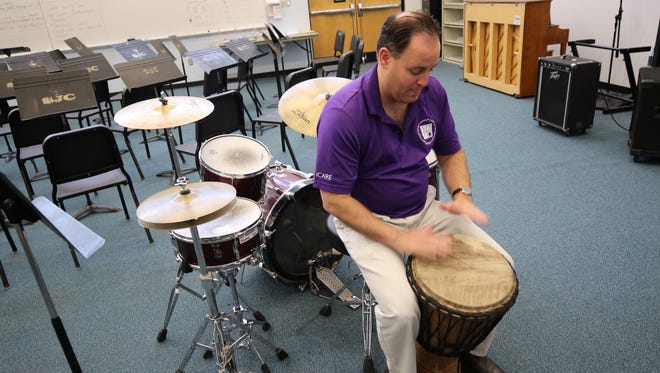African Drumming Ensemble concert planned at San Juan College
Group founded 3 years ago has swelled to nearly 20 members

- The ensemble will perform at 7 p.m. Friday in the Little Theatre on the college campus.
- This weekend's concert will last a little more than an hour and will feature eight pieces, each five to 10 minutes long.
- Tickets are $8 for adults, and $6 for students and seniors.
FARMINGTON — Melody may be the element most listeners focus on, but rhythm is the lifeblood of music, San Juan College music professor Teun Fetz says.
That belief led him to develop the African Drumming Ensemble at the school three years ago. Participation in the program was minimal that first year, with only six players. But as the group prepares for its annual spring concert this weekend, membership now has swelled to almost 20 members. Only a half dozen of those drummers are students, he said, with community members making up the rest.

"It's getting to be a full house and a pretty loud group," Fetz said last week.
At first blush, a drumming concert may sound like a rather monotonous proposition to those whose tastes run exclusively to Western music. But Fetz encourages everyone to give African drumming a listen, explaining it appeals to numerous senses.
"It's visually exciting — it's exciting to watch players play," he said, comparing that action to woodwind players, where most of the performance is internalized and the movement is minimal. African drumming, on the other hand, is a very physical endeavor in which the exertion of the player is obvious.
"When you see percussionists on stage, you can see them make the music," he said. "It's visual."
The power of the drumming carries its own appeal, especially when a larger group is playing and the vibrations envelop the room.

"Doing it in a concert hall probably doesn't do it justice," Fetz said of African drumming. "It's very earthy and ethereal."
He conceded that there will be audience members who will miss the melodic element, but he encouraged listeners to let themselves get swept away by the energy of the experience, especially those hearing it for the first time.

"It's a different way of performing music not common to Western ears," he said. "A lot of people walk away with a smile on their face. This is not depressing music."
Though there typically are no lyrics associated with African drumming performances, Fetz said that doesn't mean there isn't a verbal element behind the style.
"Almost all of them have a story that goes with them," he said, explaining that the pieces traditionally were performed as part of an effort to ward off evil spirits, as a rite of passage for boys becoming men or as part of a spiritual observance. "That doesn't necessarily come through because you don't have lyrics, but it does come through in the spirit of the music."
Most of all, Fetz said, the music's strong rhythms are something that can be universally understood.

"Even if you're alone, there's some kind of rhythm in your body," he said, referring to the patterns of movement, speech or even bodily function that everyone displays. "This showcases or highlights how rhythm can be on its own a musical product even without some of the traditional melodic instruments."

This weekend's concert will last a little more than an hour and will feature eight pieces, each five to 10 minutes long, Fetz said. Most are of West African origin, coming from Guinea, Ghana or the Ivory Coast, although Fetz said a few of the pieces have been Americanized over time.
At certain points in the performance, Fetz said he will encourage audience members to take a turn on one of the drums, something he hopes will demonstrate to listeners how accessible the music is.
Several members of the ensemble that convened in the fall of 2016 when Fetz started the group have stuck with it, while others have joined since that time, giving the group a mix of veterans and novices. Many of those more experienced players will perform as soloists this weekend, while the newcomers will help carry the rhythm.
But Fetz thinks all of them have come to understand the joy and satisfaction of African drumming.

"They're doing a great job, and I think they're enjoying it," he said.
The ensemble will perform at 7 p.m. Friday in the Little Theatre on the college campus, 4601 College Blvd. in Farmington. Tickets are $8 for adults, and $6 for students and seniors at sanjuancollege.edu/silhouette. Call 505-566-3430.
Mike Easterling can be reached at 505-564-4610.